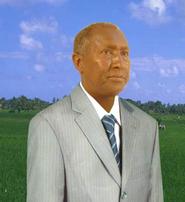
"I grew up as a nomad," announced Suleiman Nuh Ali to those in the Kirner-Johnson Auditorium on April 14. "In my childhood I cannot remember a place my family stayed more than a month." Nevertheless Ali's experience in his native Somalia was not unique: approximately 65 percent of the Somali population is nomadic, traveling "without borders." And as the lecture progressed, it became even clearer that borders – or, more specifically, the conflict between those political boundaries formed from within and those formed from without – drastically influenced the course of Somalia's history.
Somalia is comprised of four major clans and many minor clans; these groups are based upon familial lineage. Somalis hold their ancestries in high esteem and, as such, place emphasis on the "4.5 formula." This formula particularizes one's heritage in extreme detail – for example, Ali knows his 15th grandfather (whom Americans would call their grandfather with 14 "greats" preceding) and his wife knows her 32nd grandfather. This knowledge enables someone to know from which clan he or she is originally.
Somalia's involvement in international conflict began in the 1880s, when imperial Europe became fascinated with the so-called "Dark Continent." The British and the Italians, especially, colonized a good deal of Somalia and brought the Somali people under Western European rule. This continued until post-World War II, when the United Nations suggested that the separate Somali lands (there were five of them) be unified under British rule. Although Russia vetoed this proposal, the Somalis were nevertheless inspired to follow through with the notion of joining together.
Somalia indeed became independent in 1960 after British Somaliland and Italian Somaliland joined together. The Somali people elected a president and a prime minister, but the government was ultimately unstable, due in part to the discord between the Somali clans. The military staged a coup d'état and took control of the country, only to come into conflict with separate liberation movements formed by each of the clans. The political ideology had gone from "democratic to totalitarian."
The reason why the government did not work, Ali explained, was because the clans lost trust in central government. After all, it is difficult to declare a mandate that is supported by all of the clans. Currently, there is a weak government in Somaliland, a weak government in Puntland (a region in Northeastern Somalia), and an unstable government in Mogadishu, the nation's capital. Mogadishu is the site of much fighting between opposing militias, with almost 60 percent of the city destroyed.
All said and done, Ali's opinion of a solution to the Somali conflicts was simple but powerful: a successful Somali government should be built from within, and not have to suffer international intrusion. "Let the Somalis do their own thing."
In 1982 Ali was arrested by the Somali secret police and held without charges. Amnesty International adopted his case as a "prisoner of conscience." Six years later, Ali was tried for treason and sentenced to death; his sentence was commuted to 24 years in prison, however, due to international pressures. Then, after having been released from jail a year later and placed under house arrest, Ali escaped with his family to the United States in December 1990.
-- by Alex Pure '12
Somalia is comprised of four major clans and many minor clans; these groups are based upon familial lineage. Somalis hold their ancestries in high esteem and, as such, place emphasis on the "4.5 formula." This formula particularizes one's heritage in extreme detail – for example, Ali knows his 15th grandfather (whom Americans would call their grandfather with 14 "greats" preceding) and his wife knows her 32nd grandfather. This knowledge enables someone to know from which clan he or she is originally.
Somalia's involvement in international conflict began in the 1880s, when imperial Europe became fascinated with the so-called "Dark Continent." The British and the Italians, especially, colonized a good deal of Somalia and brought the Somali people under Western European rule. This continued until post-World War II, when the United Nations suggested that the separate Somali lands (there were five of them) be unified under British rule. Although Russia vetoed this proposal, the Somalis were nevertheless inspired to follow through with the notion of joining together.
Somalia indeed became independent in 1960 after British Somaliland and Italian Somaliland joined together. The Somali people elected a president and a prime minister, but the government was ultimately unstable, due in part to the discord between the Somali clans. The military staged a coup d'état and took control of the country, only to come into conflict with separate liberation movements formed by each of the clans. The political ideology had gone from "democratic to totalitarian."
The reason why the government did not work, Ali explained, was because the clans lost trust in central government. After all, it is difficult to declare a mandate that is supported by all of the clans. Currently, there is a weak government in Somaliland, a weak government in Puntland (a region in Northeastern Somalia), and an unstable government in Mogadishu, the nation's capital. Mogadishu is the site of much fighting between opposing militias, with almost 60 percent of the city destroyed.
All said and done, Ali's opinion of a solution to the Somali conflicts was simple but powerful: a successful Somali government should be built from within, and not have to suffer international intrusion. "Let the Somalis do their own thing."
In 1982 Ali was arrested by the Somali secret police and held without charges. Amnesty International adopted his case as a "prisoner of conscience." Six years later, Ali was tried for treason and sentenced to death; his sentence was commuted to 24 years in prison, however, due to international pressures. Then, after having been released from jail a year later and placed under house arrest, Ali escaped with his family to the United States in December 1990.
-- by Alex Pure '12
